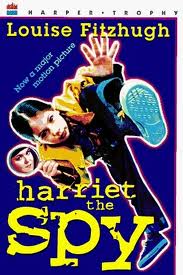Harriet the Spy (book): Difference between revisions
No edit summary |
No edit summary |
||
| (4 intermediate revisions by one other user not shown) | |||
| Line 3: | Line 3: | ||
====Region: [[:Category:North America|North America]]==== | ====Region: [[:Category:North America|North America]]==== | ||
====Subject: [[:Category: | ====Subject: [[:Category:Political/Economic/Social Opinion|Political/Economic/Social Opinion]]==== | ||
====Medium: [[:Category:Literature|Literature]]==== | ====Medium: [[:Category:Literature|Literature]]==== | ||
| Line 20: | Line 20: | ||
'''The Incident:''' ''Harriet the Spy'' recieved praise from Library Journal, the Bulletin of the Center for Children's Books and the New York Times Book Review. However, other critics rebuked the story for its alleged immorality, refering to the advice given by Ole Golly. Libraries and schools across the United States created committees to decide whether or not to offer the book. Parents and teachers claimed that children were and would begin to imitate Harriet's window peeping. <P> | '''The Incident:''' ''Harriet the Spy'' recieved praise from Library Journal, the Bulletin of the Center for Children's Books and the New York Times Book Review. However, other critics rebuked the story for its alleged immorality, refering to the advice given by Ole Golly. Libraries and schools across the United States created committees to decide whether or not to offer the book. Parents and teachers claimed that children were and would begin to imitate Harriet's window peeping. <P> | ||
'''Results of Incident:''' ''Harriet the Spy'' | '''Results of Incident:''' ''Harriet the Spy'' was removed from library shelves across the United States. Today, however, the book is back in libraries; it was also adapted into a feature film in 1996. <P> | ||
'''Source:''' Censorship, A World Encyclopedia, ed. D. Jones | '''Source:''' Censorship, A World Encyclopedia, ed. D. Jones | ||
| Line 32: | Line 32: | ||
[[Category:North America]] | [[Category:North America]] | ||
[[Category: | [[Category:Political/Economic/Social Opinion]] | ||
[[Category:Literature]] | [[Category:Literature]] | ||
| Line 38: | Line 38: | ||
[[Category:Louise Fitzhugh]] | [[Category:Louise Fitzhugh]] | ||
{{DISPLAYTITLE:<span style="font-style: italic;">Harriet the Spy</span>}} | [[Category:For review]] | ||
{{DISPLAYTITLE:<span style="font-style: italic;">Harriet the Spy</span> (book)}} | |||
__NOTOC__ | __NOTOC__ | ||
Latest revision as of 21:18, 11 November 2016
Date: 1964
Region: North America
Subject: Political/Economic/Social Opinion
Medium: Literature
Artist: Louise Fitzhugh (1928 - 1974)
Confronting Bodies: Parents, teachers, librarians and literary critics across the United States
Dates of Action: 1964 to present
Location: United States
Description of Artwork: Harriet the Spy is a children's book about a young girl, Harriet, who wants to become a spy. She gets into trouble when she writes harsh criticisms about her classmates in her journal and is caught. Harriet gets advice from her nanny, Ole Golly, to lie about what she wrote.
The Incident: Harriet the Spy recieved praise from Library Journal, the Bulletin of the Center for Children's Books and the New York Times Book Review. However, other critics rebuked the story for its alleged immorality, refering to the advice given by Ole Golly. Libraries and schools across the United States created committees to decide whether or not to offer the book. Parents and teachers claimed that children were and would begin to imitate Harriet's window peeping.
Results of Incident: Harriet the Spy was removed from library shelves across the United States. Today, however, the book is back in libraries; it was also adapted into a feature film in 1996.
Source: Censorship, A World Encyclopedia, ed. D. Jones
